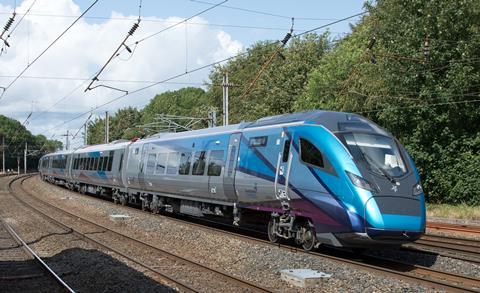
UK: TransPennine Express is to temporarily amend its West Coast Main Line services from September 12 ‘to provide greater stability and certainty to our customers’. This follows repeated disruption this year, with passengers facing regular full or part cancellations announced the previous evening or on the day.
The operator says this is the result of sustained high levels of sickness, a training backlog as a result of Covid-19, and other issues including reduced flexibility following the loss of its driver Rest Day Working agreement.
As a result, TPE has decided to amend its timetable, and take other supporting measures, in order to provide a greater level of stability and certainty to travellers.
The TOC says the changes are not being driven by budgetary considerations, but are ‘firmly aimed at supporting the best possible customer service based on the prevailing circumstances’.
Changes
The temporary timetable will see the current 40 trains each weekday reduced to a level similar level as seen before May, with 15 northbound and 16 southbound services a day on the West Coast Main Line.
The nine temporarily withdrawn services include three Manchester Airport – Glasgow services, a Liverpool – Preston service and a Manchester Airport – Lancaster service each weekday, with two Manchester Airport – Glasgow services and a Manchester Airport – Edinburgh service withdrawn over part of the route.
In the southbound direction two Glasgow – Manchester Airport services, an Edinburgh – Manchester Airport service and a Lancaster – Manchester Airport service will be withdrawn each weekday. An Oxenholme – Liverpool service will start from Lancaster and a Glasgow – Liverpool service and three Glasgow – Manchester services will each be withdrawn over part of the route.
Saturday service patterns will be broadly similar to the weekdays, while Sunday services will reflect recent patterns.
Services will continue to be impacted by planned engineering works, and there will be significant impacts on days when strike action is taking place.
Other services
The amended timetable is now available on online planning and booking tools.
TPE says it has looked closely at the proximity of other operators’ services on the WCML and feeder routes, and in most cases where services are withdrawn people can use Avanti West Coast or Northern trains close to the normal departure time.
Avanti West Coast will also make additional stops to cater for Penrith and Lockerbie customers on Saturdays which would represent an improvement over the current levels of service.
TPE said ‘where any gaps occur compared to the current advertised rail service, and in response to feedback from Transport for the North members who have been consulted on this temporary timetable, we are finalising arrangements to put in rail replacement buses at certain times of the day. These will provide additional connectivity between Motherwell and Carlisle, Penrith and Lockerbie, Edinburgh and Carlisle and Carlisle and Lockerbie to supplement rail services for those customers whose regular journey option via train is impacted.’
Reviews
The effectiveness of the timetable will be reviewed with stakeholders and the Rail North Partnership over the coming months. TPE aims to re-introduce services progressively from the December timetable change, with full restoration by May 2023 at the latest.
The operator has also faced criticism for ad hoc cancellations of services on its northern and southern trans-Pennine routes, with driver shortages and sickness compounded by the need to carry out extensive training on new rolling stock and diversionary routes as the Transpennine Route Upgrade programme progresses and routes are closed for enhancement work.
Insiders expect consultation with the Rail North Partnership and other stakeholder groups to result in some very minor changes on these service groups, particularly during off-peak hours.
Industry insiders note that the shortage of drivers across a number of TOCs was forecast at the start of the pandemic, when it was pointed out that retirements and moves new roles would continue and the gap in the replacement pipeline caused the pause in training would start to create problems within a couple of years.
This has been exacerbated by a range of issues including the offer of some significantly higher salaries by rail freight operators, and even the road haulage sector where train drivers have been attracted across by pay offers in excess of their earnings on the railway.



